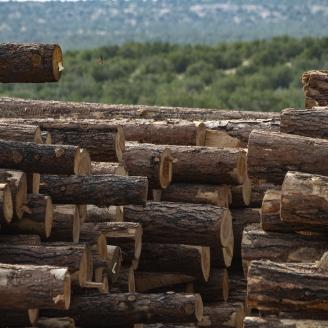
The Ecological Sciences Division (ESD) leads the technology for Natural Resources Conservation Service (NRCS) in ecological, cultural resource, and environmental compliance technologies to ensure science-based conservation for our Nation's resources.
Who we are and what we provide
ECS is responsible for carrying out the agency's mission as it pertains to ecological sciences in the delivery of technical assistance and programs to USDA clients. ECS is responsible for maintaining the National Planning Procedures Handbook, the Field Office Technical Guide, as well as individual discipline manuals and handbooks used in conservation planning and technical assistance delivery in Mississippi. The principal functions of ECS are to, 1) ensure that conservation planning provided to USDA clients meet agency standards, 2) that conservation planning addresses quality criteria for soil, water, air, plants and animals, 3) that social and economic considerations are addressed, 4)environmental and cultural resource laws are observed during the conservation planning process, and 5) that agency and partner organization field staff and technical service providers are adequately trained to perform these functions.
ECS is a multidisciplinary team that includes a cultural resources specialist, biologist, GIS specialist, plant materials manager, grazing land management specialist, and forestry specialist. This ECS team is directed by the State Resource Conservationist (SRC). ECS provides leadership, training, and technical over-site on conservation planning procedures, methods, and techniques. ECS ensures quality assurance on all conservation planning applications, that state-of-the-science technology transfer is provided to USDA clients, and certified professionals meet minimum criteria to perform effective conservation planning on the land.
Functions
Integrate agricultural, ecological, environmental, fish & wildlife, cultural heritage and energy concerns into all NRCS programs.
-
Develop and implement new technologies to assess and treat soil, water, air, plant, animal, and energy resource concerns.
-
Provide leadership and technology for erosion prediction and control, nutrient management and comprehensive nutrient management plans, pest management, forestry, fish and wildlife management, highly erodible land and wetland compliance, air quality, invasive species and pollinators, range and pasture management, water quality, soil quality, historical and cultural resources, and organic farming.
-
Provide leadership for policy and maintenance of the Field Office Technical Guide (FOTG), National Conservation Practice Standards, and the National Technical Guide Committee.
-
Develop policies and guidelines for NRCS compliance with laws, regulations, and Executive Orders pertaining to ESD expertise.
-
Provide national technical liaisons for NRCS with other agencies and groups for ecological and cultural resources-related legislation, policy, and initiatives.
-
Provide leadership for plant data information through the National Plant Data Center.
-
Provide leadership for the National Plant Materials Program that selects, evaluates, increases, and releases plant materials and plant technology for conservation uses.
-
Provide leadership and guidance for training and employee development in ecological and cultural resources activities.
Programs and Activities
Technical Resources

Agronomy
Conservation cropping systems for residue management and improving soil quality, water quality and profitability on cropland in Mississippi.
Residue and Tillage Management no Till/Strip-till
This practice includes planting methods commonly referred to as no-till, strip till, direct seed, zero till, slot till or zone till. Approved implements are no-till and strip-till planters; certain drills and air seeder; strip-type fertilizer and manure injectors and applicators; in-row chisels; and similar implements that only disturb strips and slots. All others are considered to be full-width or capable of full disturbance and therefore not compatible.
Residue Management, Seasonal
Seasonal residue management includes managing residues of annual crops from harvest until the residue is:
- Buried by tillage for seedbed preparation
- Removed by grazing, or
- Mechanically removed
It also includes the management of residues form biennial of perennial seed crops from the time of seed harvest until regrowth begins the next season.
Residue and Tillage Management Mulch-till
This practice includes tillage methods commonly referred to as mulch tillage where a majority of the soil surface is disturbed by tillage operations such as vertical tillage, chiseling and disking and also includes tillage/planting systems with relatively minimal soil disturbance, but which do not meet the criteria for Residue and Tillage Management (No Till/Stiip Till/Direct Seed) (Code 329). It applies to stubble mulching on summer-fallowed land, to tillage for annually planted crops and to tillage for planting perennial crops.
It also includes some planting operations, such as hoe drills that disturb a large percentage of the soil surface during the planting operation and cropping systems in which the majority of surface area is disturbed during harvest.
Residue and Tillage Management Ridge-till
This practice includes tillage and planting methods commonly referred to as ridge till or ridge planting. It does not include no-till planting on ridges, or bedding or listing operations that bury crop residues.
Following crop harvest, residues shall remain on the surface until planting with no additional disturbance except for normal weathering.
After planting, residues shall be maintained in the furrows until the ridges are rebuilt by cultivation. Ridges shall be rebuilt to their design height and shape during the last row cultivation.
Cover Crops
Managing Cover Crops
Termination Cover Crops

Biology
Fish and Wildlife (General)
NRCS pursues a science-based approach in the development and implementation of conservation practices benefiting fish and wildlife. As such, NRCS has developed and distributed scientifically based technical materials related to fish and wildlife habitat management. these materials are available for use to all interested parties including landowners, NRCS staff, Conservation Districts, Fish and Wildlife Agencies and Farm and Wildlife Groups.
Fish/Wildlife Habitat Leaflets for Selected Species can be located at the following website:
National Fish & Wildlife Leaflets
Leaflets are produced in cooperation with the Wildlife Habitat Council
Technical and Financial Assistance to Producers to Create Fish and Wildlife Habitat
NRCS Conservation Practices that are commonly used in Mississippi to directly address fish and wildlife habitat management include:
- Conservation cover (PC# 327)
- Prescribed Burning (PC# 338
- Field Borders (PC # 338)
- Riparian Herbaceous Buffers (PC# 390)
- Riparian Forest Buffers (PC# 391)
- Firebreak (PC# 394)
- Fishpond Management (PC# 399)
- Hedgerow Planting (PC# 422)
- Tree/Shrub Establishment (PC# 612)
- Restoration and Management of Rare and Declining Habitat (PC# 643)
- Wetland Wildlife Habitat Management (PC# 644)
- Upland Wildlife Habitat Management (PC# 645)
- Shallow Water Habitat Development and Management (PC# 646)
- Early Successional Habitat Development/Management (PC# 647)
- Wetland Restoration (PC#657)
- Forest Stand Improvement (PC# 666)
NRCS Conservation Practices that are commonly used in Mississippi to indirectly address fish and wildlife habitat management or are used as supporting practices for direct fish and wildlife practices include:
- Brush management (PC# 314)
- Herbaceous Weed Control (PC# 315)
- Dike (PC# 356)
- Filter Strip (PC# 393)
- Tree/Shrub Site Prep (PC# 490)
- Structure for Water control (PC# 587)
- Forest Trails and Landings (PC# 655)
For more information

Cultural Resources
Cultural Resources Fact Sheet
Our Cultural Resources Fact Sheet page describes the important role cultural resources plays in support of the Natural Resources Conservation Service Mission.
NRCS Cultural Resources Training Series
(Go to Agricultural Learning Service under USDA Employee Resources and log in)
National NRCS Cultural Resources webpage
Cultural Resources Compliance Process
Final Draft Mississippi NRCS Prototype PA (PDF)
Cultural Resources Review Form
Instructions for completing the MS-CR-1 form (PDF)
Sample MS-CR-1 Form (PDF)
Instructions for Mississippi Site Files Section Grid (PDF)
Classification of Conservation Practice Effects on Cultural Resources
Effects Document (PDF)
Table 1. Conservation Practice Descriptions and Classifications (PDF)
Cultural Resources Guidance Documents
Mississippi Cultural Resources Procedures Handbook (PDF)
Compliance Process Overview (PDF)
Compliance Process Flowchart (PDF)
Check Sheet for Review Practices and Field Inspections (PDF)
Mississippi Cultural Resources Fact Sheets
Indian Mounds (PDF)
Cultural Resources Links
Mississippi Department of Archives and History
Mississippi Archaeological Association
Indian Mounds of Mississippi
Vicksburg National Military Park
Southeastern Archaeological Center, NPS
Southeastern Archaeological Conference
National Park Service
United South and Eastern Tribes
Lower Mississippi Delta Region Initiative
Strategies for Protecting Archaeological Sites on Private Lands
Archaeology for Kids
Southeastern Region Outline of Prehistory and History

Invasive Species
Every day, invasive species are threatening the health of our nation's vital agricultural and natural lands. Forests are being infested, cropland production is being negatively impacted, streams and waterways are being choked with weeds, and wildlife species are losing habitat. These conditions are just a few of the negative impacts that will continue, or will become more severe, if successful actions are not taken to halt and/or reverse this trend.
Technical and Financial Assistance to Producers to Manage Invasive Species and Pests 
NRCS technical assistance for invasive species begins with NRCS invasive species policy that:
- Directs NRCS to prevent the introduction of invasive species, to provide for their control, and encourage the use of native plants species in restoration activities
- Encourages partnerships and local assistance for compiling State and Regional invasive species lists and in detection of invasive species
- Requires assisting with detection, inventorying and monitoring on private lands as part of the conservation planning process
- Requires informing landowners of the presence of invasive species and providing appropriate conservation technical assistance.
NRCS Conservation Practices that are commonly used in Mississippi to directly address invasive species management and control include:
- Brush management (PC# 314)
- Herbaceous Weed Control (PC# 315)
- Prescribed Burning (PC# 338)
- Prescribed Grazing (PC# 528)
- Integrated Pest management (PC# 595
- Early Successional Habitat Development/Management (PC# 647)
- Forest Stand Improvement (PC# 666)
Invasive Plants
Invasive plants, designated by state or national authorities as threatening to agricultural and/or horticultural crops and/or humans, livestock and native wildlife, included species such as the fast-growing kudzu vine that blankets the eastern, southern and central United States. This and many other invasive plants compete with desired plants such as crops or native vegetation reducing economic productivity and upsetting ecological integrity.
Over the past several years, the rate of introduction of invasive plants has risen significantly, degrading renewable resources, diminishing the productive capacity of agriculture lands and degrading wildlife habitat. NRCS primarily helps producers to tackle invasive species problems by providing technical and financial assistance to manage invasive species and pests. NRCS works internally through its Plant Materials Centers and with many other partners to address the spread of plants that have been classified as noxious or invasive.

Threatened & Endangered Species
Farmers, ranchers and forest landowners are making voluntary improvements to their land, helping save habitats for at-risk, threatened and endangered species.
Owners and managers of working lands coordinate with NRCS through the agency’s Working Lands for Wildlife partnership with the U.S Fish and Wildlife Service to create and enhance wildlife habitat for many different species, including those facing population troubles. This work helps reverse population declines of seven wildlife species targeted in the partnership as well as provides benefits to other wildlife.
Two of the endangered species in Mississippi are the Gopher Tortoise and the Black Pine Snake.
Additional Information
Agronomy
The National Agronomy Manual (NAM) contains policy for agronomy activities and provides technical procedures for uniform implementation of agronomy tools and applications. This manual is meant to complement all established USDA and NRCS policies and guidelines.
Learn More
